.gif)

.gif)

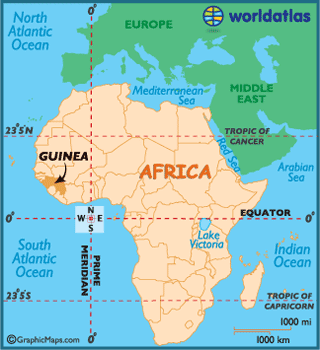
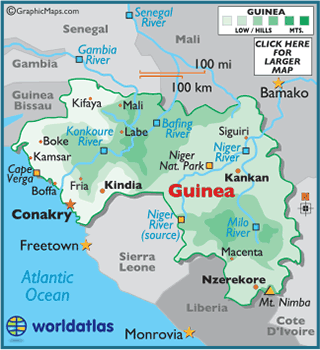
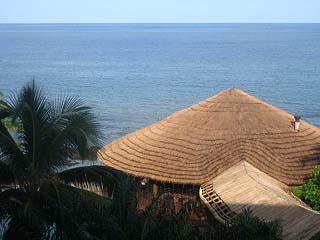
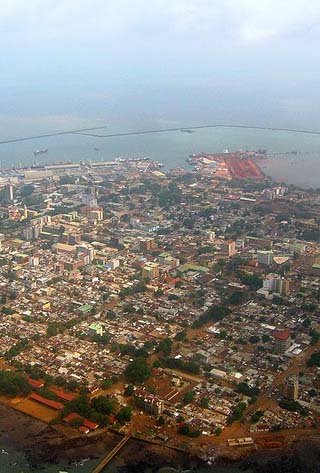
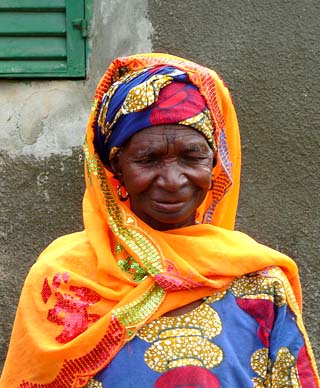
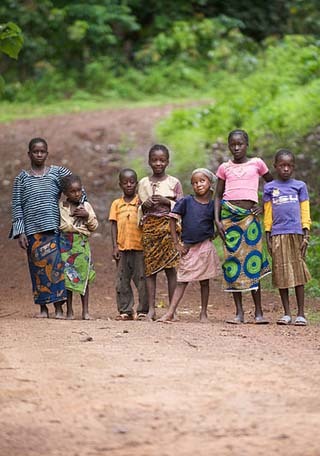
Tel Code..: +224
Ethopian Airlines - Royal Air Maroc - Senegal Airlines-Air France - Emirates
Viza..: Needs
Courses or boosters usually advised: Hepatitis A; Poliomyelitis; Tetanus; Typhoid; Yellow Fever.
Other vaccines to consider: Cholera; Diphtheria; Hepatitis B; Meningococcal Meningitis; Rabies.
Yellow fever vaccination certificate required for travellers over 1 year of age arriving from countries with risk of yellow fever transmission.
Name: Rep.de GUINEA
Guinea, (formerly known as French Guinea) is today one of Africa's poorest
countries. It's sometimes called Guinea-Conakry to distinguish it from its
nearby neighbor Guinea-Bissau.
Guinea belonged to a series of empires until Francecolonized
it in the 1890s, and subsequently made it part of French West Africa.
Slave trade flourished with the arrival of the Europeans,
and political instability prevailed as the French struggled
to control their colonies within the Guinean region.
Guinea finally declared its independence from France on
October 2, 1958, and since that independence Guinea has had only three
autocratic presidents.
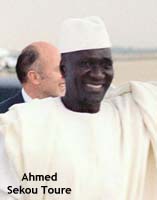 Ahmed Sekou Toure was
elected first president, due in part to his leadership during the fight for
freedom against France, and adopted socialistic policies - aligning the country
with the Soviet Union.
Ahmed Sekou Toure was
elected first president, due in part to his leadership during the fight for
freedom against France, and adopted socialistic policies - aligning the country
with the Soviet Union.
Plots and conspiracies against Toure flared as his government imprisoned and
exiled hundreds of opposition forces.
In 1984, Lansana Conte came to power after a military coup seized the government
following the death of Toure. Guinea did not hold democratic elections until
1993 when General Conte (head of the military) was elected president of the
civilian government.
Conte completely flipped the government, turning away from socialism, and had
250 political prisoners released, with an additional 200,000 citizens returning
from exile.
He was reelected in 1998 and 2003.
Unrest in Sierra
Leone and Liberia has
spilled over into Guinea on several occasions over the past decade, threatening
stability and creating humanitarian emergencies. In 2006, declining economic
conditions prompted two massive strikes that sparked urban unrest in many
Guinean cities.
On December 23, 2008, Lansana Conte passed away, and Moussa Dadis Camara seized
control of Guinea. The following year, he ordered soldiers to attack any protest
attempt against his endeavor to become president, which ultimately sparked a
spree of mutilation and murder.
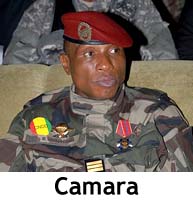 Camara was shot
during a dispute in December 2009, and during his medical care, Vice President
Sekouba Konate assumed control.
Camara was shot
during a dispute in December 2009, and during his medical care, Vice President
Sekouba Konate assumed control.
Elections were held in June and July of 2010, and Alpha Conde was declared the
official winner.
Under French rule,
Guinea was a major exporter of coffee, bananas, pineapples and peanuts, however
recent autocratic rulers have all but destroyed that economic engine.
Guinea also has 25% of the world's known bauxite reserves, as well as diamonds
and gold, but war and political unrest have curtailed those industries as well.
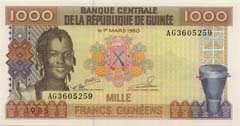
GEO:STATISTICS
Climate:
The best time of the year in Guinea is November through March, when day
temperatures are mild. Nevertheless, the Harmattan winds spread Saharan sand
through much of the country from December through February.
The months of July and August are the height of the rainy season and many roads
are closed. Conakry alone gets more than 160 in (406 cm) of rain each year.
The exports and imports gap in the country is relatively lower.
Major exportable items of the country are gold, diamonds, coffee and fish. Its exports partners are US, Spain, Ireland, and Ukraine.
Important importable items in the country are machines, metals, textiles, and petroleum products. For imports it depends upon the countries such as China, Belgium and France.
The following diagram shows the levels of exports and imports of the country over various years:
CONCLUSION
In the year 1963, Guinea joined the World Bank. Since then the bank has undertaken many projects for the country to reduce poverty and foster economic growth.